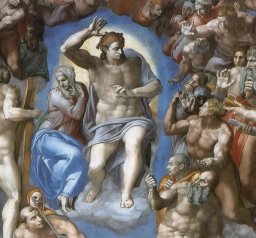King Lear: Dost thou know me, fellow?
Kent: No, sir; but you have that in your countenance which I would fain call master.
King Lear: What's that?
Kent: Authority.
Why have we hired Barack Obama for what
The Onion called, half-seriously perhaps, "the worst job in the world?" We obviously did not hire him for his
executive experience; rather, his appeal depends on leadership qualities, judgment, and temperament.
Obama inspires
without having to rely on empty demagoguery or the "cult of personality." People are tired of the extreme partisan rancor that has taken over national politics for the past 15 years or so (I'm happy to admit that Democrats have contributed to this as well, but in my opinion less than Republicans). Obama has charisma and obviously uses it to achieve his aims (and he needed it to help win the election), but if anything he constantly downplays this characteristic. Recall that a year ago he was often criticized for being dry, aloof, and "professorial." As I've written before, unlike most politicians, Obama does not seem to need the adulation of the masses, but rather views it as a necessary means to political ends.
Obama is like Bill Clinton in that he is both charismatic and wonkish--he really does have a meticulous interest in getting things done; he is more pragmatist than ideologue. Unlike Clinton, he is also highly disciplined. He is a leader who inspires people to work their butts off for him, and as his flawlessly run campaign suggests, he is good at spotting talent. But he panders less than most politicians (it's probably impossible to get elected without pandering at all). After all, in his speeches he has spoken of personal sacrifice and "tightening our belts"--how long has it been since we heard that?
In terms of judgment, it is hard to overstate the significance of Obama's early opposition to the Iraq war in 2002, at a time when this was a minority opinion and a politically risky one. The war is finally wrapping up, and it has been overshadowed by the economy as has everything else, but it is good to remember that, despite the final "success" of "the surge," the war overall was the greatest tragic blunder of the Bush presidency. From the vantage point of 2002, Obama could have been disastrously (for his political prospects) wrong, but he wasn't.
In terms of general administrative skills, Obama endured, with remarkable grace and resilience, what may have been the longest (22 months) and most grueling single political campaign in American history. His operation was huge, involving all fifty states and, of course, hundreds of millions of dollars. The people he chose to run it did so with admirable unity and efficiency. Can even this huge campaign operation automatically be extrapolated to the massive extent of the federal government? Of course not, but it is a promising sign. Part of what we're after is sheer
competence; after all, the Bush administration was so dismaying not merely because of ideology but also because of ineptitude (see Iraq War, Katrina response, etc.). And sure enough, in his first days Obama is not staffing his White House with eager but green 20-somethings; rather, he is looking to experienced political figures for wisdom. Also, how much foreign policy experience did Governors Clinton and Bush have when they took over?
I was slow to warm to Obama. A year ago I was saying that Hillary Clinton would make a better acting President (although I never did think she could win the general election--too much baggage). And until recently I had always had some admiration for John McCain (the last eight years would have been much different, and in a good way, if he could have bested George W. Bush in 2000). Indeed, as recently as a few months ago I was fairly complacent about the election because I figured we would get a decent administration regardless of the outcome.
But McCain's erratic behavior in the closing months, and his willingness to take the low road with negative campaigning (even if it wasn't as negative as it could have been), was alarming to me. It is good to remember that there really was no truly
conservative choice this election season. Indeed, the Bush administration has been so objectionable because it
hasn't been conservative; it has been
radical, in its unilateralism, its extreme economic policy, and its disregard for consensus. McCain's increasing coziness with these Bush trends over the past couple of years, coupled with his "maverick" status, made me wonder what the heck he might do if given the most powerful position on earth? Palin was the last straw--not a "maverick" choice but rather a radical and reckless one--and showed me that McCain had finally gone around the bend. In fact, I try to avoid ageism, but his erratic behavior overall made me wonder, in a neurobiological sort of way, what exactly was going on in that 72-year-old brain.
In terms of experience, one can always revisit the example of Lincoln, who technically had less experience than Obama when elected. Lincoln probably was a risky choice at the time and could have turned out to be a disaster (why not just let the South go and leave slavery for the next generation?). But people clearly saw qualities in him that promised exceptional leadership and judgment. I'm definitely not saying Obama is another Lincoln, and he could certainly fail, or be a very qualified success like Bill Clinton. But I would argue that from the vantage point of the current time, he is overall the
least risky, and the most favorable, choice we have.














